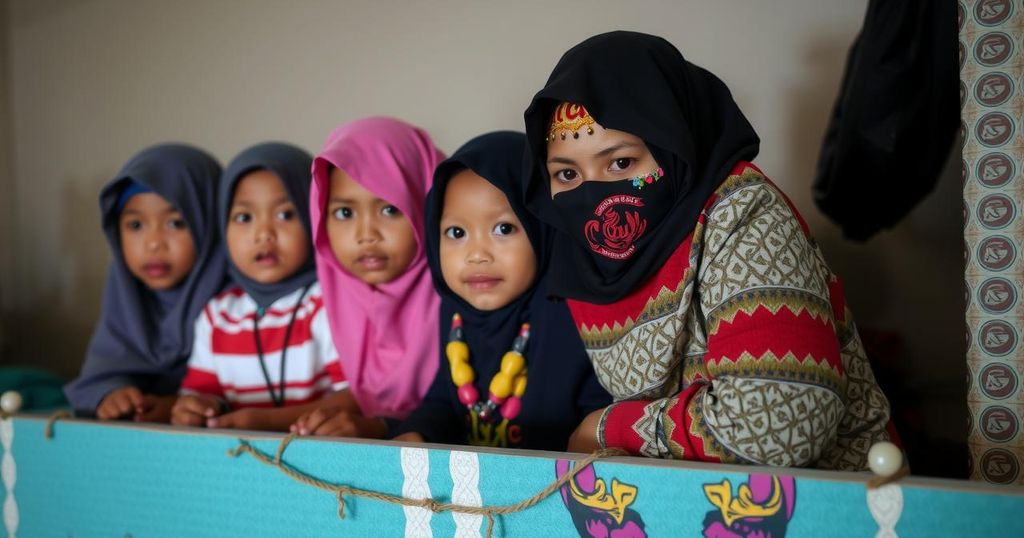Analysts Urge Indonesia to Repatriate and Deradicalize IS-Linked Families in Syria

Amidst Syria’s shifting political landscape, Indonesian analysts urge the repatriation of nearly 400 citizens linked to Islamic State militants to prevent exploitation and a return to militancy. The National Counterterrorism Agency is assessing individuals for repatriation, emphasizing deradicalization and societal reintegration, particularly for children. Despite past policies against repatriation, the new administration is exploring pathways to manage the complexities of returning citizens while ensuring community support and rehabilitation.
In light of the recent shift in the political environment in Syria following the downfall of President Bashar al-Assad, analysts are advocating for Indonesia to repatriate approximately 400 citizens with ties to the Islamic State (IS) group. Experts warn that if these individuals are not returned and rehabilitated, they risk being drawn back into militancy or exploited in international conflicts. Yanuardi Syukur from the University of Indonesia emphasizes the importance of cooperating with Syria’s new government to facilitate safe repatriation while mitigating security threats stemming from extremist ideologies.
The Syrian conflict, which began in 2011, has resulted in the dire circumstances of foreign fighters and their families, particularly within the al-Hol and Roj refugee camps, where over 70,000 individuals currently reside. Conditions in these camps are reported to be severely deficient, with concerns over exploitation and indoctrination of residents, including a notable population of Indonesian families. The National Counterterrorism Agency (BNPT) is currently evaluating potential returnees, focusing on the processes of deradicalization and their planned reintegration into society, as stated by Tjandra Sulistiyono, the bureau chief at BNPT.
Indonesia’s policy approach has changed under the new administration of President Prabowo Subianto, especially since the previous government had opted against the repatriation of IS-linked citizens. The challenge is compounded by a history of returnees engaging in further terrorist activities, such as the suicide bombing in Jolo, which underscores the risks involved in reintegration efforts. Between 2013 and 2017, many Indonesians traveled to Syria to join IS, complicating the current scenario as a significant number remain unaccounted for.
Experts stress the necessity of distinguishing between those who uphold IS ideologies and those who have repudiated them to devise a phased repatriation strategy prioritizing lower-risk individuals. Legal complexities surrounding the citizenship status of children born in the conflict zones further complicate repatriation discussions. Therefore, it is crucial to prioritize children, as articulated by Rakyan Adibrata, emphasizing their inability to choose their circumstances.
Lastly, the effectiveness of deradicalization programs is highly dependent on available resources and community support. Adlini Ilma Ghaisany Sjah highlights that rehabilitation must be personalized and sustained to effectively address the trauma experienced by returnees. Additionally, fostering societal acceptance is vital in preventing recidivism among returning individuals, necessitating collaboration with civil society organizations experienced in counterterrorism.
The ongoing situation in Syria has left a significant number of foreign fighters and their families stranded in camps such as al-Hol and Roj. Following the defeat of Islamic State militants in 2019, countries worldwide, including Indonesia, have faced the pressing decision of whether to repatriate these individuals and how to address the associated risks. The Indonesian government has faced scrutiny due to its history of Islamist violence, making the repatriation and rehabilitation of citizens linked to extremist groups particularly sensitive. The Indonesian National Counterterrorism Agency estimates that a considerable number of these citizens consist of families, thus complicating the process of assessment and reintegration into society.
In conclusion, Indonesia’s path toward repatriation and deradicalization of its citizens linked to IS in Syria presents both challenges and opportunities. With a recent change in government policy, the focus on collaboration with the new Syrian leadership and the implementation of a careful assessment strategy illustrates a proactive step toward addressing the complexities of this issue. Prioritizing the needs of children and ensuring robust community support and tailored rehabilitation programs are essential to mitigate risks of re-engagement in extremist activities among returnees. The long-term success of these efforts relies on a comprehensive approach that encompasses legal, psychological, and social dimensions.
Original Source: www.benarnews.org








